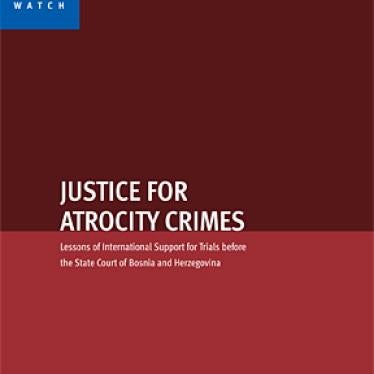Ratko Mladic's transfer to The Hague on 31 May 2011 is a milestone for international criminal justice. The Serbian warlord's forthcoming trial at the International Criminal Tribunal for the former Yugoslavia (ICTY) will cap what many regard as the most successful war-crimes court since Nuremburg.
The tribunal has hitherto sentenced sixty-four defendants for war crimes, including top generals from Bosnia, Serbia and Croatia. It has indicted former heads of state. With Mladic's arrest, only one out of 161 people indicted by the court - Goran Hadzic, who led rebel Serbs during the war in Croatia - remains at large.
The court, along with its counterpart for Rwanda, has also created important legal precedents for international criminal law. These include the conclusion that rape can be a war crime and issues relating to the crime of genocide, as well as helping to develop national expertise in the Balkans to try war crimes fairly.
The tribunal's success has helped cement the idea that when those behind wartime atrocities cannot brought to justice at home, the international community should step in. That has helped bolster support for the International Criminal Court (ICC) and for prosecutions of war crimes in foreign courts under the principle of "universal jurisdiction".
These achievements make it hard to remember that the ICTY's success was, even after it was created in 1993, far from assured. True, it made early strides in marshalling the evidence to bring indictments, including the one against Mladic, in 1995. But without a police force, it lacked the means to take suspects into custody. Indeed, those pressing for the creation of the ICC in the late 1990s avoided comparison to the tribunal, fearing its lack of progress would discourage governments from supporting the new permanent court.
A testing period
In 1997, I helped run a campaign for Human Rights Watch, together with Amnesty International and other non-governmental organisations, to persuade Nato peacekeepers in Bosnia to arrest war-crimes suspects indicted by the tribunal. At the time, the tribunal had only eight suspects in custody, most of them lower level "little fish". More than fifty suspects were at large in Bosnia, and the prospects of arrests of high-level suspects seemed remote.
Nato peacekeepers initially contended they were not authorised to carry out arrests for the tribunal; and that such arrests would destabilise Bosnia, and put their troops in harm's way. British Nato troops did arrest one suspect early in 2007; but Nato governments continued to insist that they would only arrest suspects when they "encountered" them, and claimed to have no information as to their whereabouts.
When a Human Rights Watch map showing the proximity of Nato bases and the last known whereabouts of suspects across Bosnia was carried in newspapers across Europe and the United States in November 2007, along with extensive advocacy with Nato governments and headquarters, we began to see real progress on arrests, including by Nato countries previously reluctant to act.
But Nato's reach was limited to Bosnia. Serbia and Croatia were granting citizenship to their ethnic brethren from Bosnia and refusing to extradite them to face trial, and there were new indictments for crimes committed inside Croatia, Serbia and Kosovo. Clearly a second approach was needed.
The balance-sheet
The opportunity was provided by the European Union's enlargement strategy. By offering the prospect of eventual membership, with closer ties linked to progress on human rights and cooperation on war crimes, the EU had the ideal lever for the handover of suspects to the tribunal. US pressure also played an important role.
EU conditionality was not always consistent. Some EU governments wanted to embrace Croatia and Serbia without any guarantee of the handover of key suspects. But ultimately, with non-governmental groups pressing the issue, media scrutiny and the fortitude of the Netherlands and a handful of other EU states, the EU held firm. Finally, the big targets - including the Croatian general Ante Gotovina, the Bosnian Serb wartime president Radovan Karadzic, and now Ratko Mladic were arrested to face justice.
The tribunal is not perfect: crimes against minorities in Kosovo arguably didn't get enough attention, and Slobodan Milosevic was able to drag out his trial before his death precluded a proper ending. Moreover, several challenges remain, notably in striking the balance between fairness and expediency in the Karadzic case (since he, like Milosevic, has chosen to represent himself). The tribunal is likely to face similar difficulties in the Mladic case, especially if the UN Security Council is unwilling to take the importance of the trial into account as it presses the tribunal to wind up its work.
But this should not detract from its accomplishments in delivering justice for the worst crimes in Europe since the second world war and developing and building support for international justice. Such achievements are real reasons to celebrate.





